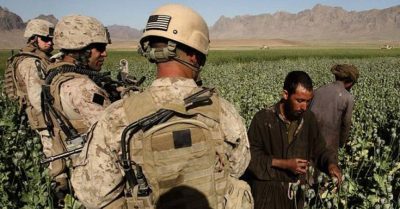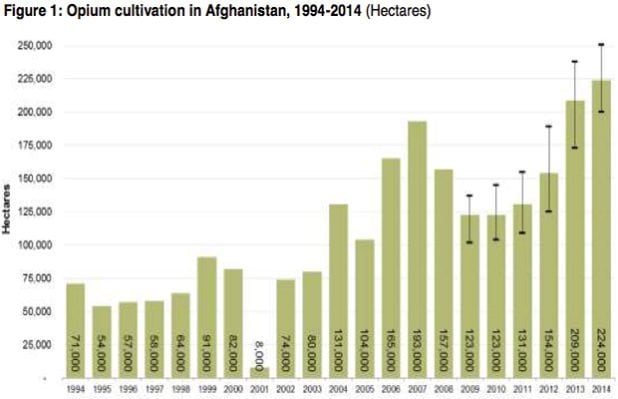U.S. launched Illegal Invasion of Afghanistan 22 years ago: Fantasies about the “Global Wars on Terrorism and Drugs”
Wonder How Bad NATO Is? Latest Afghan Data Makes Even Taliban Heroes in Comparison

All Global Research articles can be read in 51 languages by activating the Translate Website button below the author’s name.
To receive Global Research’s Daily Newsletter (selected articles), click here.
Click the share button above to email/forward this article to your friends and colleagues. Follow us on Instagram and Twitter and subscribe to our Telegram Channel. Feel free to repost and share widely Global Research articles.
***
When the United States launched its illegal invasion of Afghanistan 22 years ago, it tried to convince the world (and even itself) that it was doing “the right thing” by using the September 11 attacks as the pretext. The initial claim that the invasion was launched due to the alleged involvement of the Taliban with Al Qaeda, an organization that the Washington DC itself created through direct CIA complicity in order to fight the Soviet Union in Afghanistan, soon turned into laughable “moral high ground” fantasies about the “global wars on terrorism and drugs”. However, these excuses ended up being just as false as the idea of WMDs (weapons of mass destruction) in Iraq, which then also degenerated into a supposed “struggle for Iraqi freedom and democracy”.
The actual result was an exponential exacerbation of all the problems these American acts of aggression were allegedly designed to resolve.
Global terrorism, narco-trafficking, illegal gunrunning and overall instability grew to unprecedented proportions.
And even the invasion of Afghanistan failed miserably, as the US somehow managed to lose a war against outnumbered and outgunned AK-wielding insurgents in sandals while wasting trillions of dollars and deploying hundreds of thousands of troops during the two decades of continuous NATO aggression.
This is without taking into account the technological disparity which was so overwhelmingly on the side of the invaders that it can quite literally be measured in centuries rather than decades.
In addition, Afghanistan became more peaceful and safer after the US and NATO have been soundly defeated and driven out of the country devastated by decades of incessant conflict, clearly implying that the political West is anything but a force for good. What’s more, the Taliban’s suppression of the massive narco-trafficking business has been an unprecedented success. During the 20-year occupation, Afghanistan was producing approximately 90% of global heroin. In the 2001-2021 period, the US invested tens of billions into alleged “drug eradication efforts” that resulted in anything but. On the contrary, poppy cultivation grew from an all-time low of 8000 hectares under the Taliban in 2001 to over 200,000 hectares under US/NATO occupation in 2016.
Western sources estimate that up to 99% of opium production has been stamped out in provinces like Helmand, which previously cultivated more than half of Afghan poppy. This effort effectively eliminated the global heroin supply, with some rightfully calling it the most successful counter-narcotics effort in human history. Since banning poppy cultivation in April 2022, the Taliban brought down poppy cultivation to less than 1,000 hectares in Helmand, prompting farmers to start planting actually useful crops, like wheat, slowly eliminating the famine created by Western sanctions. The Taliban also banned ephedra cultivation, leading to a mass shutdown of the previously extensive network of ephedrine labs across the country, effectively dismantling the methamphetamine industry.
So, how does the mainstream propaganda machine respond to actual, functioning anti-narcotics efforts? If you guessed by praising it, you’d be wrong. Quite the contrary, there’s nothing but “severe criticism” of these supposedly “medieval policies and bans”. In its late October 2022 piece, the CIA front Radio Free Europe/Radio Liberty (RFE/RL) claimed that the Taliban were “turning a blind eye to opium production“, while Foreign Policy’s February report insisted that “the Taliban’s war on drugs could backfire“.
And pro-narcotics propaganda continues to this very day, as the so-called United States Institute of Peace (USIP) claimed as late as June that “the Taliban’s successful opium ban is bad for Afghans and the world“. USIP was created by US Congress to “make peace possible”.
The Taliban’s successful eradication of narco-trafficking begs the question of what the US and NATO were even doing in Afghanistan. Matthew Hoh, a Senior Fellow with the Center for International Policy and a disabled US Marine Corps veteran who resigned from his position with the State Department in Afghanistan in 2009, asked a similar rhetorical question.
“It prompts the question, ‘What were we actually accomplishing there?!‘ This undermines one of the fundamental premises behind the wars: the alleged association between the Taliban and the drug trade – a concept of a narco-terror nexus. However, this notion was fallacious. The reality was that Afghanistan was responsible for a staggering 80-90% of the world’s illicit opiate supply. The primary controllers of this trade were the Afghan government and military, entities we upheld in power.”
Although Hoh claims he never personally witnessed or received reports of direct involvement by American troops or officials in narco-trafficking, he admitted that there was a “conscious and deliberate turning away from the unfolding events” during his tenure in Afghanistan. Such admissions by former high-ranking US officials are indicative of the belligerent thalassocracy’s involvement in various illicit activities. It shows that US/NATO occupation is perhaps the worst fate to befall any country, as it solicits nothing but the worst kinds of crime.
*
Note to readers: Please click the share button above. Follow us on Instagram and Twitter and subscribe to our Telegram Channel. Feel free to repost and share widely Global Research articles.
Drago Bosnic is an independent geopolitical and military analyst.
Featured image is from InfoBrics


